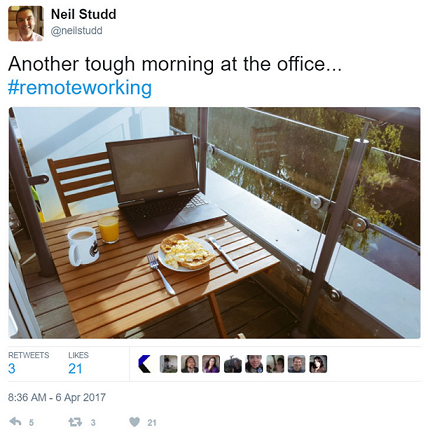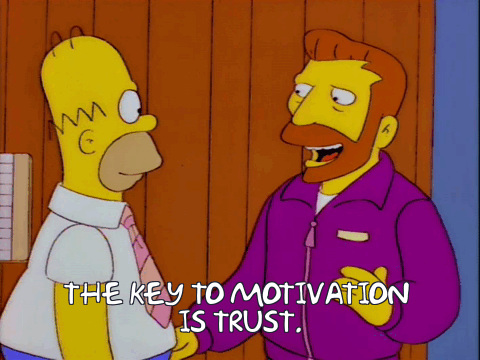Remote and hybrid working is undoubtedly a hot topic at the moment, especially on the subject of a so-called “return to the workplace” which has been happening as we look towards a post-pandemic world. The companies making the biggest headlines are the ones who are removing remote working privileges; most recently, Frasers Group (owners of House of Fraser and Sports Direct) have ended their “Frasers Fridays” perk.
This change was announced in an internal memo by the company’s COO, David Al-Muldall, who stated that Friday had become “an unproductive day of the week”, adding that there were “too many examples of people or teams not being contactable when they need to be”, and “colleagues who via their social media profiles are demonstrating they’re not treating Friday as a working day”.
A productivity rebuttal
As with most leaked internal memos, we’re left to fill in the blanks for ourselves, although there are some disturbing implications: Why are Frasers Group monitoring employees’ social media profiles? What was the information which was shared (was it merely afternoon drinks in the garden)? And in an organisation with over 25,000 employees, just how many “examples” did they see which prompted a change in company policy?
I’ve not been averse to sharing photos of my own - here’s an example from 2017, back when full-time remote working was an unusual practice which I was keen to promote:

This was a photo taken from the balcony of my riverside penthouse flat, enjoying breakfast (with my laptop) on a sunny day. Would this have fueled tempers at Frasers Group? Would they view this as “less productive”? I’d argue that, actually, checking my emails over breakfast is an anti-pattern which I shouldn’t have been doing - the work can wait! But, if I’m going to do an early check-in of my emails, then why not do it in an environment where I feel happier and more productive?
Productivity is less of an issue for remote employees than over-working. The average length of our working days is increasing, despite all evidence suggesting that we’re more productive with shorter hours. People use their previous commute time to do “just a bit more work”. Our phones are more connected than ever, with workday boundaries becoming more blurred, and people being expected to be instantly reachable at all times. It’s become so bad that the “Right to Disconnect” is being passed in law throughout Europe right now.
If it’s not a productivity concern, then what is it? Well, remote working has always been an exercise in trust. Going back a few years more, when I worked for an organisation which had a 1-day remote working perk, there was always some internal banter about how it was the “doing the gardening” day - but such jokes threatened to undermine the benefit.
Frasers drew attention to people “not being contactable when they need to be”: this isn’t a problem that can be ascribed to remote working. I’ve worked in enough offices over the years where I observed the same problem - for instance, key personnel being engaged in meeting rooms all day, or insisting on an all-day “do not disturb” mode - and the solution isn’t “change the location where you sit”. It’s an issue for management (or, in the case of a scrum team, self-management through feedback).
When you’ve got a few bad apples, you address the bad apples - you don’t torch the orchard.
Organisations need to earn trust too
Remote working is a privilege. Not everybody wants to do it (some people thrive on the buzz of office life). Not everybody can do it (it’s not suited to all job roles, and there’s a “digital divide” whereby not everybody who would like to work remotely has access to the quiet space, technology or infrastructure which is required for remote working)
There’s no “one size fits all” approach to any working practice, which is why the most successful companies are those which make a variety of approaches available to employees: the Escape the City 100 list boasts that it helps to find “the place to find work you believe in, at organisations doing things differently”. (In many ways, it’s a shame that these have to be highlighted as outliers, rather than the norm.)
Frasers have spoken about losing trust in their employees, but as an employer, they’ve done a great deal of harm here. And it’s not just the policy change, or the social media monitoring concerns: a BBC article adds the following (albeit unverified) insight:
It is understood bosses at Frasers Group had been measuring the productivity of staff on Fridays since the start of the flexible working scheme and decided to pull people back into the office.
Putting aside the question of how they have been (secretly?) monitoring productivity - a subject for another article - this is another action which reveals systemic trust issues within the organisation. While I’m sure the company has considered the motivational impact on its current employees (and have probably made some cold financial considerations around the likely employee attrition), there’s also the reputational impact which will affect their ability to hire new talent in the future. Glassdoor ratings can be make-or-break when you’re advertising new roles; what do Frasers think that their current (and soon-to-be past) team will have to say about this decision?
Don’t deal in absolutes
In one final quote, a Frasers Group spokesperson said:
“We have an incredible workforce of dedicated colleagues, and in-person collaboration is key to how we deliver value together. We believe that we are all at our best when we work together in an office environment.”
Aside from the fact that such a statement sounds like it was written by committee, you need to be careful when using words such as “all”, “always” or “never”. Some people may work best in an office environment. Some people may work best when they have more control over where they work. Some people might prefer a four-day week, or a late start, or being able to finish early to support their family.
I’m not sure that people always believe such sweeping statements. I’ve observed this myself, when working for an organisation which decreased its remote working privileges with a very similar statement, when the actual underlying issue was “we’ve just invested in a massive new purpose-built office, and we need to justify the cost of it”.
I enjoy the buzz of a working hub, and it’s one of the reasons that I’ve always favoured the term “remote working” over “working from home”: our homes aren’t always our most productive space, and sometimes being around other people - for instance, in a coffee shop or co-working space - brings the best out of us. But let’s stop making sweeping assumptions about what our employees want, or how they are expected to behave.
Key takeaways 📝
- Demonstrate your own productivity by being productive.
- Organisations need to trust their employees, but they also need to earn employees’ trust.
- Think very carefully before taking a role with Frasers Group.

